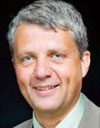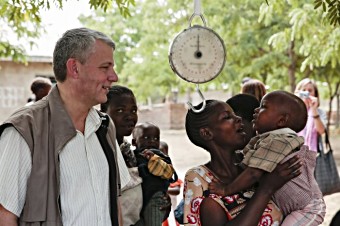
Dagfinn Høybråten
Board Chair of the GAVI Alliance

Dagfinn Hoybraten, Chair of the GAVI Board with a mother and child awaiting vaccination. Shambarai, Tanzania, December 2012. Copyright: GAVI Alliance 2012/Robert Beechey
After an hour’s drive on dusty, bumpy roads out of Arusha, Tanzania we arrived in Shambarai village. I was asked to address a group of parents, mostly mothers and a few fathers, who had brought their young children to be vaccinated and were gathered under a tree. Some of the parents had walked more than 20 kilometres to receive basic vaccinations for their children.
This week Tanzania will take an important step to protect its children against two of the biggest child killers – pneumonia and severe diarrhoea – by introducing pneumococcal and rotavirus vaccines.
I will never forget the look on the parents’ faces when I told them this news. They know instinctively and sometimes from painful experience that these diseases too often claim the lives of children before they reach their fifth birthdays. The parents were relieved to be able to protect their children against these illnesses.
My trip to Shambarai was a field visit in connection with the GAVI Alliance Partner’s Forum. More than 600 of our allies are gathered in Dar es Salaam to consider the progress we have made together and how we can build on it in the coming years.
The United Republic of Tanzania has much to be proud of. In 1999, 147 out of every 1000 children died before their fifth birthday. That figure was down to 67 in 2011, and Tanzania is on the track to reach the Millennium Development Goal on child mortality: a reduction of the under-five mortality rate by two thirds between 1990 and 2015.
Monday I witnessed the partnership that has brought us here at work. I was part of a GAVI delegation that visited several different vaccination sites near Arusha. We visited a district level health centre, a regional health centre and took part in the vaccination outreach in Shambarai.
The district representative of WHO told us how they have worked with the local authorities and other partners to prepare for pneumococcal and rotavirus vaccine introductions by training health workers, expanding the cold chain and raising awareness of the effort through advocacy.
To help spread the word about the importance of vaccinating children, the health workers in turn worked with local government leaders and civil society organisations as well as religious leaders in the community. And they did well, scoring above the targets set for immunisation coverage in the community.
At the Usa River Health Centre, I had the privilege of giving little Barack two drops of polio vaccine. Thinking of how close we are to wiping out polio, and the continued financial commitment and political will needed to finish the job, was a moving reminder of the power of partnership to save lives.
